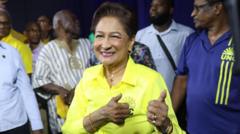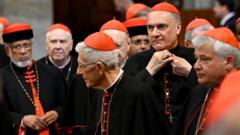In a landmark vote, Netumbo Nandi-Ndaitwah has made history by becoming Namibia's first female president, while the ruling South West Africa People's Organization (SWAPO) manages to maintain its dominance amid wider political upheaval in southern Africa.
Namibia Makes History: First Female President Elected Amidst Election Upsets in Southern Africa

Namibia Makes History: First Female President Elected Amidst Election Upsets in Southern Africa
Namibia's ruling SWAPO party retains control and elects its first female president, defying the trend of political shifts in the region.
In a significant political event for Namibia, the country has elected its first female president, Netumbo Nandi-Ndaitwah, marking a historic moment amidst a year characterized by political shifts in southern Africa. This election result reflects the resilience of Namibia's ruling party, the South West Africa People's Organization (SWAPO), which continues to govern after winning the general election despite a decrease in parliamentary seats.
Nandi-Ndaitwah, who previously held roles as the deputy prime minister and minister of international relations, garnered 57.31% of the presidential vote, succeeding the late President Hage G. Geingob, who passed away earlier this year. This election has also resulted in SWAPO securing 51 out of 96 parliamentary seats, a reduction from the 63 seats won in 2019, suggesting growing discontent related to the nation's stagnant economy.
The main opposition, led by Panduleni Itula under the banner of the Independent Patriots for Change, claimed 20 seats, indicating a significant yet manageable challenge to SWAPO's continued reign. Despite losing seats, SWAPO's overall strength remains firm, proving that Namibia's political landscape, while evolving, is still anchored in longstanding party loyalty.
Nandi-Ndaitwah's victory is a beacon of progress for women's representation in leadership roles in Africa, joining a select group of female leaders on the continent. As Namibia navigates a complex political environment, her presidency may introduce new initiatives aimed at addressing economic issues and revitalizing public trust in governance.
Nandi-Ndaitwah, who previously held roles as the deputy prime minister and minister of international relations, garnered 57.31% of the presidential vote, succeeding the late President Hage G. Geingob, who passed away earlier this year. This election has also resulted in SWAPO securing 51 out of 96 parliamentary seats, a reduction from the 63 seats won in 2019, suggesting growing discontent related to the nation's stagnant economy.
The main opposition, led by Panduleni Itula under the banner of the Independent Patriots for Change, claimed 20 seats, indicating a significant yet manageable challenge to SWAPO's continued reign. Despite losing seats, SWAPO's overall strength remains firm, proving that Namibia's political landscape, while evolving, is still anchored in longstanding party loyalty.
Nandi-Ndaitwah's victory is a beacon of progress for women's representation in leadership roles in Africa, joining a select group of female leaders on the continent. As Namibia navigates a complex political environment, her presidency may introduce new initiatives aimed at addressing economic issues and revitalizing public trust in governance.






















